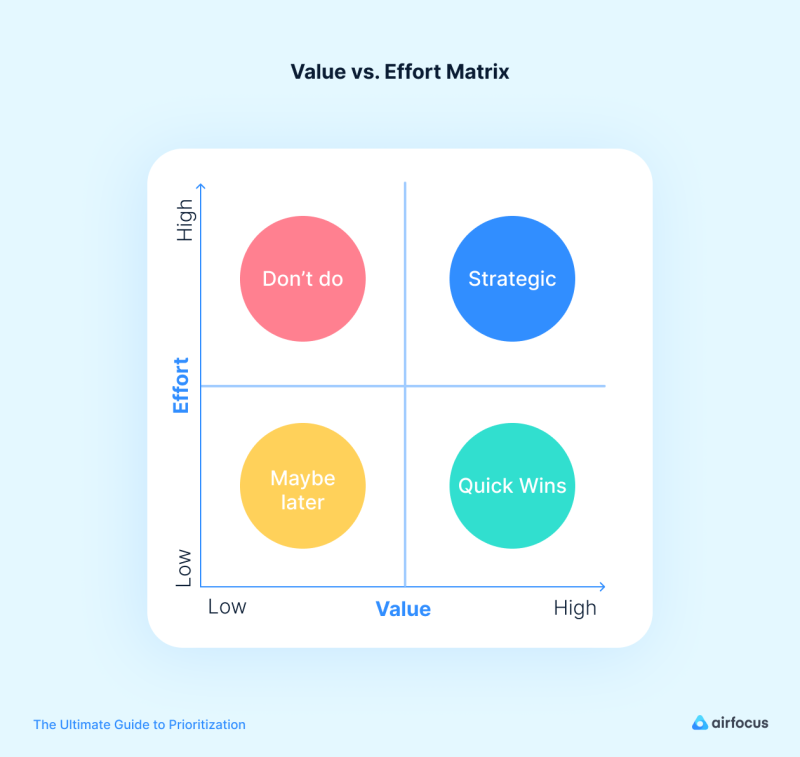The true value of AI in product management (insights from Dr. Bart Jaworski)

In a recent episode of airfocus's Top PM Voices webinar series, we had the privilege of hosting Dr. Bart Jaworski, who shed light on the transformative role of AI in product management. The central question he addressed was whether AI has genuinely revolutionized the field and the daily lives of product managers or if its impact is more hype than reality.
Dr. Jaworski's session went beyond all the buzz, focusing on the actual value AI brings to product managers. He offered practical guidance on integrating AI into products effectively, navigating the complexities, and harnessing AI's potential to drive innovation and efficiency. This article aims to distill the key insights from Dr. Jaworski's enlightening webinar, exploring his perspectives on the most pressing questions about AI in product management.
What AI means for product managers
The role of an AI product manager
An AI product manager is a subject matter expert who guides a dedicated team to build AI-based services and solutions. This role requires a deep understanding of AI technologies and the ability to lead a tech team. The distinction between a general product manager and an AI product manager has blurred, as many are now prioritizing AI solutions to leverage the AI trend.
Learn about the different product management roles (including AI PM) in this article.
Do all product managers need AI proficiency?
Not every product manager needs to become an AI expert. It is essential to understand the process of integrating AI features into products, including the costs and collaboration with developers. Basic knowledge of AI and its applications is sufficient for most product managers.
Expertise required for AI product managers
AI product managers need to have a solid understanding of coding languages like Python and the ability to build and tweak AI models. For those looking to specialize in AI, courses and guidance from AI experts can be beneficial. Practical experience in introducing AI features and understanding their implications is crucial.
Determining AI fit for a product
To determine if AI is a good fit for a product, follow the standard discovery and feasibility processes. Prioritize AI features based on their value and effort estimation. AI should be treated as just another tool in the product manager's toolkit.
Tip: You can use airfocus's Value vs. Effort template to prioritize AI opportunities.

Key considerations for integrating AI
Accuracy: Ensure AI can handle tasks without significant errors.
Cost: AI queries are expensive, and financial implications must be considered.
Time: AI projects often require more time and research.
Privacy: Protect client data and ensure compliance with privacy regulations.
Legal: Be aware of legal issues related to using AI, especially concerning copyrighted material.
Successful AI integration examples
AI has been effectively used in image generation and enhancement tools, such as those in Photoshop and MidJourney. These tools speed up work and democratize the creation of images, making them accessible to a broader audience.
AI Assist by airfocus is an example of effectively integrating AI into a product. As part of the world's first modular product management platform, AI Assist empowers product managers with AI-driven tools embedded directly in item descriptions and comments. With a simple slash command, product managers can quickly generate ideas, create first drafts, analyze feedback sentiment, and simplify technical jargon. These features save valuable time and enhance productivity, allowing product managers to focus on strategic tasks. AI Assist's tailored prompts, such as writing PRDs and user stories, demonstrate how AI can streamline workflows and improve efficiency, showcasing the real value of AI in product management.
Future trends in AI and product management
The future of AI in product management includes more AI tools designed specifically for product managers. These tools will help streamline work and improve efficiency. Product managers should act as the voice of reason and ethical responsibility for AI, ensuring that AI initiatives are feasible and beneficial to users.
What AI tools do you use daily?
Dr. Bart Jaworski mentioned several AI tools he uses daily:
Copilot in Skype: For research and quick definitions.
MidJourney: For generating and enhancing images.
AI Image Upscale: For improving the quality of older images.
Conclusion
AI offers significant potential for product management, but it should be approached with caution and a clear understanding of its capabilities and limitations. By integrating AI thoughtfully and responsibly, product managers can unlock new opportunities and drive innovation in their products.
Additional resources
When You Have a Hammer: Where to Leverage AI in your Product Manager Toolbox - Adam Hecht
AI-Powered Feature Request Management: Streamlining Feedback into Action - Sami Rehman
The Pros and Cons of Using AI in Customer Insights - Sami Rehman
Integration of AI in Product Design and Development - Adam Thomas
Will ChatGPT Really Change Product Management? - Andrea Saez
Augmenting Product Management Excellence with AI: Beyond the Hype - Malte Scholz

Nouran El-Behairy

Read also


Experience the new way of doing product management

Experience the new way of doing product management





